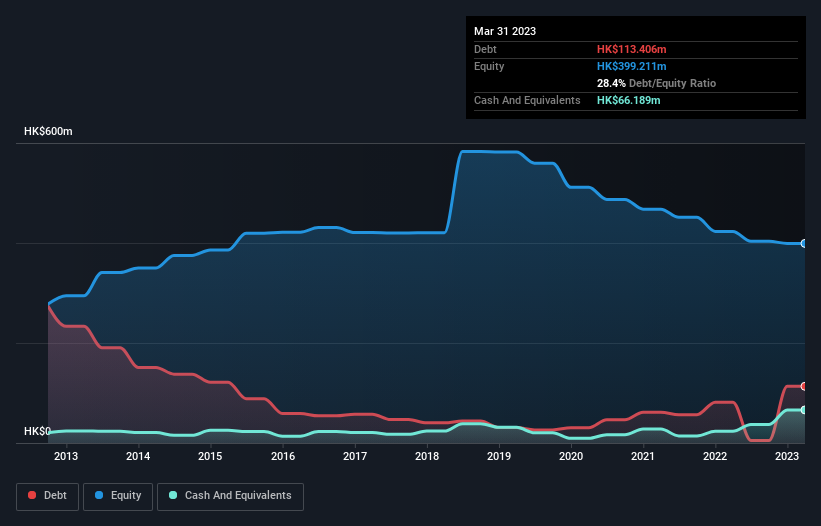Legendary fund manager Li Lu (who Charlie Munger backed) once said, 'The biggest investment risk is not the volatility of prices, but whether you will suffer a permanent loss of capital.' When we think about how risky a company is, we always like to look at its use of debt, since debt overload can lead to ruin. As with many other companies Mexan Limited (HKG:22) makes use of debt. But the real question is whether this debt is making the company risky.
Why Does Debt Bring Risk?
Debt assists a business until the business has trouble paying it off, either with new capital or with free cash flow. Part and parcel of capitalism is the process of 'creative destruction' where failed businesses are mercilessly liquidated by their bankers. While that is not too common, we often do see indebted companies permanently diluting shareholders because lenders force them to raise capital at a distressed price. Of course, plenty of companies use debt to fund growth, without any negative consequences. When we think about a company's use of debt, we first look at cash and debt together.
View our latest analysis for Mexan
How Much Debt Does Mexan Carry?
The image below, which you can click on for greater detail, shows that at March 2023 Mexan had debt of HK$113.4m, up from HK$81.7m in one year. On the flip side, it has HK$66.2m in cash leading to net debt of about HK$47.2m.

How Healthy Is Mexan's Balance Sheet?
Zooming in on the latest balance sheet data, we can see that Mexan had liabilities of HK$117.1m due within 12 months and liabilities of HK$86.1m due beyond that. On the other hand, it had cash of HK$66.2m and HK$39.5m worth of receivables due within a year. So its liabilities total HK$97.5m more than the combination of its cash and short-term receivables.
This is a mountain of leverage relative to its market capitalization of HK$127.8m. Should its lenders demand that it shore up the balance sheet, shareholders would likely face severe dilution. There's no doubt that we learn most about debt from the balance sheet. But it is Mexan's earnings that will influence how the balance sheet holds up in the future. So if you're keen to discover more about its earnings, it might be worth checking out this graph of its long term earnings trend.
In the last year Mexan wasn't profitable at an EBIT level, but managed to grow its revenue by 359%, to HK$126m. When it comes to revenue growth, that's like nailing the game winning 3-pointer!
Caveat Emptor
Even though Mexan managed to grow its top line quite deftly, the cold hard truth is that it is losing money on the EBIT line. Indeed, it lost a very considerable HK$23m at the EBIT level. Considering that alongside the liabilities mentioned above does not give us much confidence that company should be using so much debt. Quite frankly we think the balance sheet is far from match-fit, although it could be improved with time. However, it doesn't help that it burned through HK$27m of cash over the last year. So in short it's a really risky stock. When analysing debt levels, the balance sheet is the obvious place to start. However, not all investment risk resides within the balance sheet - far from it. Be aware that Mexan is showing 2 warning signs in our investment analysis , and 1 of those is a bit unpleasant...
If you're interested in investing in businesses that can grow profits without the burden of debt, then check out this free list of growing businesses that have net cash on the balance sheet.
New: Manage All Your Stock Portfolios in One Place
We've created the ultimate portfolio companion for stock investors, and it's free.
• Connect an unlimited number of Portfolios and see your total in one currency
• Be alerted to new Warning Signs or Risks via email or mobile
• Track the Fair Value of your stocks
Have feedback on this article? Concerned about the content? Get in touch with us directly. Alternatively, email editorial-team (at) simplywallst.com.
This article by Simply Wall St is general in nature. We provide commentary based on historical data and analyst forecasts only using an unbiased methodology and our articles are not intended to be financial advice. It does not constitute a recommendation to buy or sell any stock, and does not take account of your objectives, or your financial situation. We aim to bring you long-term focused analysis driven by fundamental data. Note that our analysis may not factor in the latest price-sensitive company announcements or qualitative material. Simply Wall St has no position in any stocks mentioned.
About SEHK:22
Mexan
An investment holding company, supplies building materials and furniture in Hong Kong.
Excellent balance sheet with low risk.
Market Insights
Community Narratives




